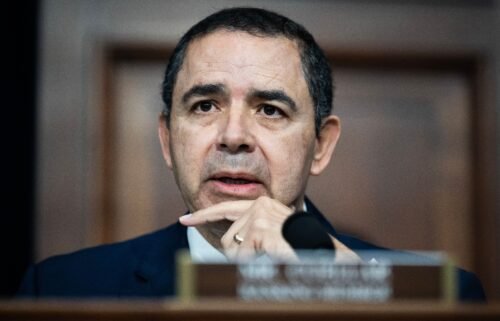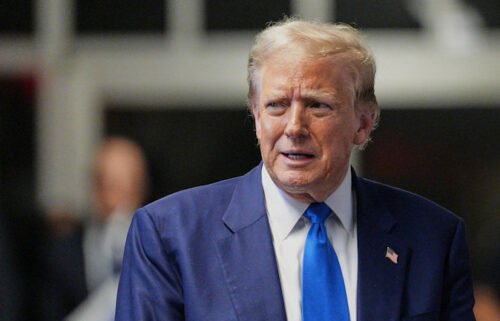Biden administration searching for ways to keep US forces in Niger to continue anti-terror operations despite overthrowing of government
By Natasha Bertrand and Oren Liebermann, CNN
(CNN) — The Biden administration is searching for ways to keep US forces and assets in Niger to continue anti-terror operations, even as it becomes increasingly unlikely that the military junta that overthrew the country’s government last month will cede power back to the democratically elected president.
The Pentagon is evaluating what authorities it can use to continue to operate in a primarily intelligence gathering role in Niger if the military takeover there is deemed a coup d’etat by the State Department – a legal determination that would strip the US military of some of its authorities and funding to engage in security cooperation with Nigerien forces.
If a coup determination is made, administration officials have also explored the possibility of issuing a waiver to allow certain US military activities to continue, officials told CNN. Congress for the first time last year incorporated the waiver into its 2023 omnibus spending bill, allowing the secretary of state to waive the restrictions on national security grounds.
A National Security Council spokesperson declined to comment on “what decisions could be made,” but said that “any decision we take will be in accordance to US law.”
“While we continue to give diplomacy a chance and continue force protection measures for US personnel and facilities, our force posture in Niger has not changed, and we continue to evaluate next steps in service of both our democratic and security goals,” the spokesperson told CNN.
Many administration officials believe that keeping a presence in Niger is vital to efforts to tackle terrorism in the region and argue that it’s feasible even amid the domestic political turmoil there. Several of the junta leaders have worked with and been trained by the US as part of the US’ security cooperation with the country, officials said, and Nigerien military leaders have not voiced anti-American sentiment or asked the US to leave.
A key variable is Brig. Gen Moussa Barmou, the American-trained commander of the Nigerien special operations forces who has helped lead the military takeover and proclaimed himself Niger’s chief of defense.
Maj. Gen. J. Marcus Hicks, the former commander of Special Operations Command Africa who worked closely with Barmou, said he “is not anti-western,” and added that it would be feasible for the US to continue working with the Nigerien military.
“Barmou is a friend to a lot of us in the US military,” he said. “I have no sense that they want us to leave.”
Acting Deputy Secretary of State Victoria Nuland met with Barmou when she traveled to Niger earlier this month to try to negotiate a return to democratic rule in the country. Barmou also keeps in touch with several current and former US military officials he has worked with over the years, sources told CNN.
‘The grayest of the gray areas’
The US military mission in Niger is one of the main reasons why the US has held off so far on legally declaring the situation a military coup d’etat, instead engaging in extensive diplomacy to try to reverse the Nigerien military takeover, officials said. The Economic Community of West African States, France, and the EU have all deemed the situation a coup.
“We have assets and interests in the region, and our main priority is protecting those interests and protecting those of our allies,” deputy Pentagon press secretary Sabrina Singh said on Tuesday. “So a [coup] designation … certainly changes what we’d be able to do in the region, and how we’d be able to partner with the Nigerian military.”
But a decision to keep US assets in place could create friction with allies and other countries in the region concerned about potential US cooperation with the military junta currently in control of Niger.
“It’s like the grayest of the gray areas you could think of,” said Alan Van Saun, a former Army special forces officer who worked with Barmou in Niger. “We absolutely have a national interest in that area staying secure. But we also have an international interest in promoting democratic processes and due process. So how do we continue to support the military? How do we continue to achieve our interests, while also not encouraging future coups?”
White House and Pentagon officials are extremely wary of leaving the country and giving up the US drone air base near Agadez, Niger, known as Air Base 201, officials told CNN.
The drone flights out of Agadez have given the US the ability to monitor threats in the Sahel region from a relatively close and stable position, especially as the number of violent terror organizations have carried out a growing number of attacks in neighboring Mali and Burkina Faso. According to the Africa Center, a Defense Department think-tank, violence linked to militant Islamists killed an estimated 8,000 people in the region in 2022, nearly double the previous year.
Officials also fear that pulling the approximately 1,100 US troops currently stationed in Niger out of the country could leave a vacuum that Islamist militants and the Russian mercenary organization Wagner Group try to exploit.
“Despite their public statements claiming they support Nigerien security, the leaders of this attempted coup are putting Niger’s security at risk, creating a potential vacuum that terrorist groups or other malign groups may exploit,” the NSC spokesperson said.
Van Saun said he believes Barmou is “playing a long game,” however, and doesn’t see the takeover as a temporary arrangement.
“He is strategic and has been playing the long game for his whole adult life,” Van Saun said. “The fact that he was willing to potentially sacrifice the US military support and military aid means that the whole group is convinced that they are on the right side of justice.”
For now, the pressure to pull out of the country is not as great as it would be if the Nigerien military asked the US to leave or if violence erupted.
“The lack of violence has given us the time to explore a range of options,” one defense official said.
‘Niger is our access to the Sahel’
Hicks told CNN that he believes the coup attempt and the possibility the US will pull out of the country “bodes poorly for our counterterrorism efforts in the region.”
US forces could fall back to Côte d’Ivoire and base intelligence, surveillance and reconnaissance assets there, if given permission, Hicks said. But he added that “Niger is our access to the Sahel, and the appearance is now that we’re going to lose it, barring some creative way to not call this a coup.”
Already, the US has suspended its security cooperation with the Nigerien military while officials evaluate how to move forward amid the military takeover, which has “limited’ the US ability to collect intelligence in the region, a US defense official said.
One major concern for US officials is that pulling forces out of Niger could be irreversible, representing the permanent loss of a military presence that played a crucial role in US intelligence efforts gathering in the region.
The relatively limited military footprint in Niger allowed the US to carry out surveillance and reconnaissance missions in the region, but it was never intended to be the primary force carrying out offensive operations, according to Joseph Siegle, who heads the Africa Center’s research and strategic communications program. The US rarely launched counter-terrorism strikes in the Sahel, instead passing the intelligence on to national partners to engage a target.
“That isn’t the role the US has wanted to play,” said Siegle. “The personnel and equipment [the US military] has in Niger is mostly for intelligence, surveillance, and reconnaissance types of efforts – it’s about understanding, it’s about getting information, it’s about movements and communications and things that are evolving on the ground, which are then provided to the national security partners.”
But it’s a mission that would be far more difficult to carry out from outside Niger, given the country’s close proximity to Mali, Burkina Faso and other nations that have seen an increase in violent extremism.
Following the withdrawal of American forces from Afghanistan, the US military touted its ability to conduct so-called over-the-horizon operations in the country, but the missions require flying in unmanned drones from thousands of miles away and severely limiting the time the drone could spend over the target area.
Removing forces from Niger could create a similar situation, forcing the US to fly drones from potentially distant airfields and requiring the US to secure overflight rights to reach Niger, a sensitive matter to negotiate with any country.
“Presumably, there are other ways that the US could gain information from a more distant location, but Niger provides a very central location for this,” said Siegle. “Especially as you’re trying to support real time operations for the security forces, time and precision matters.”
The-CNN-Wire
™ & © 2023 Cable News Network, Inc., a Warner Bros. Discovery Company. All rights reserved.
CNN’s Jennifer Hansler contributed reporting.



